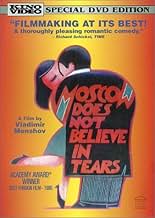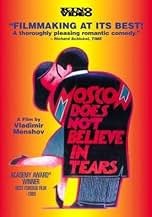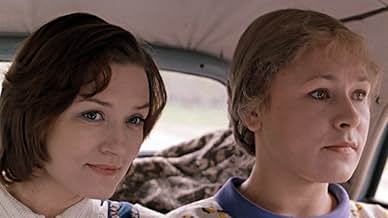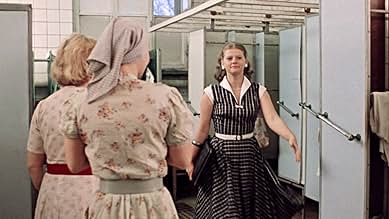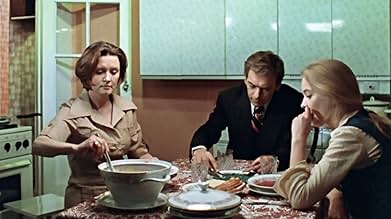AVALIAÇÃO DA IMDb
8,0/10
15 mil
SUA AVALIAÇÃO
Esta é a história de vida de três noivas desde a juventude até o outono. Seus sonhos e desejos, amor e decepções.Esta é a história de vida de três noivas desde a juventude até o outono. Seus sonhos e desejos, amor e decepções.Esta é a história de vida de três noivas desde a juventude até o outono. Seus sonhos e desejos, amor e decepções.
- Direção
- Roteiristas
- Artistas
- Ganhou 1 Oscar
- 3 vitórias e 1 indicação no total
Vladlen Paulus
- Pyotr Lednev
- (as V. Paulus)
- Direção
- Roteiristas
- Elenco e equipe completos
- Produção, bilheteria e muito mais no IMDbPro
Avaliações em destaque
This is one of the most captivating love stories I've ever seen on film. It starts with a young woman (Katya, played by Vera Alentova) reporting to her Worker's Dormitory friends that she has flunked by two points the exam to get into university. It ends with the most incredible sweetness of life.
It is like a French film done by a Russian company (which is what it is). The Moscow we see that does not believe in tears does believe in love, and it is not a Moscow of politics, although some people do call one another "comrade." This is a woman's point of view film (a "chick flick") that transcends any genre cage. It begins slowly, almost painfully dull in a way that will remind the viewer of all the clichés about Russia, the unstylish dress, the worker's paradise that isn't, the sharp contrast between Moscow and the peasants who live outside the city. Katya works in a factory. She works at a drill press. She is obviously underemployed. Lyudmila (Irina Muravyova) works in a bakery. She is probably gainfully employed for the time and place. They are friends, twentysomethings who are on the make for a man, but not a man from the sticks. They pretend to be university post docs or something close to that and they impress some people as they house-sit a beautiful Moscow apartment.
This is how their adult life begins in a sense. Lyudmila falls in love with an athlete; Katya becomes infatuated with a television cameraman. One thing leads to another and before we know it they are forty. Neither relationship worked out. The athlete becomes an alcoholic, the cameraman, in the sway of his mother, believes that Katya is beneath him (once he finds out that she works in a factory). How wrong he is, of course.
But no more of the plot. I won't spoil it. The plot is important. The characterizations are important. The story is like a Russian novel in that it spans lots of time, but once you are engaged you will find that the two and a half hours fly by and you will, perhaps like me, say at the end "What a great movie!" My hat is off to director Vladimir Menshov and to Valentin Chernykh who wrote the script and to the cast. I've mentioned Vera Alentova and Irina Muravyova, but Aleksey Batlov who played Gosha was also excellent. I don't want to say anymore. Just watch the film. It is one of the best I've ever seen.
(Note: Over 500 of my movie reviews are now available in my book "Cut to the Chaise Lounge or I Can't Believe I Swallowed the Remote!" Get it at Amazon!)
It is like a French film done by a Russian company (which is what it is). The Moscow we see that does not believe in tears does believe in love, and it is not a Moscow of politics, although some people do call one another "comrade." This is a woman's point of view film (a "chick flick") that transcends any genre cage. It begins slowly, almost painfully dull in a way that will remind the viewer of all the clichés about Russia, the unstylish dress, the worker's paradise that isn't, the sharp contrast between Moscow and the peasants who live outside the city. Katya works in a factory. She works at a drill press. She is obviously underemployed. Lyudmila (Irina Muravyova) works in a bakery. She is probably gainfully employed for the time and place. They are friends, twentysomethings who are on the make for a man, but not a man from the sticks. They pretend to be university post docs or something close to that and they impress some people as they house-sit a beautiful Moscow apartment.
This is how their adult life begins in a sense. Lyudmila falls in love with an athlete; Katya becomes infatuated with a television cameraman. One thing leads to another and before we know it they are forty. Neither relationship worked out. The athlete becomes an alcoholic, the cameraman, in the sway of his mother, believes that Katya is beneath him (once he finds out that she works in a factory). How wrong he is, of course.
But no more of the plot. I won't spoil it. The plot is important. The characterizations are important. The story is like a Russian novel in that it spans lots of time, but once you are engaged you will find that the two and a half hours fly by and you will, perhaps like me, say at the end "What a great movie!" My hat is off to director Vladimir Menshov and to Valentin Chernykh who wrote the script and to the cast. I've mentioned Vera Alentova and Irina Muravyova, but Aleksey Batlov who played Gosha was also excellent. I don't want to say anymore. Just watch the film. It is one of the best I've ever seen.
(Note: Over 500 of my movie reviews are now available in my book "Cut to the Chaise Lounge or I Can't Believe I Swallowed the Remote!" Get it at Amazon!)
Vladimir Menshov's well-balanced 'Moscow does not believe in tears' provides a moving story about human warmth. About fortunes and misfortunes that can befell anyone of us -- enabling us to identify easily.
This film also is about a very East European female eagerness to hunt after Mr. Right. Pressure is on, for in Communist society failure usually meant a lifelong condemnation to a poor, worried, boring and tiring life in some drab Russian provincial town. With a big possibility that your husband would booze himself up too much.
No doubt this film's acting makes its strongest feature. Its uninterrupted, breathtaking quality convincingly carries you back some fifty years in time. To Moscow, the capital of the USSR. Although this Communist society has been gone for a long time, 'Moscow does not believe in tears' will easily get you back there.
This film also is about a very East European female eagerness to hunt after Mr. Right. Pressure is on, for in Communist society failure usually meant a lifelong condemnation to a poor, worried, boring and tiring life in some drab Russian provincial town. With a big possibility that your husband would booze himself up too much.
No doubt this film's acting makes its strongest feature. Its uninterrupted, breathtaking quality convincingly carries you back some fifty years in time. To Moscow, the capital of the USSR. Although this Communist society has been gone for a long time, 'Moscow does not believe in tears' will easily get you back there.
Culturally interesting since this occurs in a Communist country that US propaganda gave little insight on the values and realities of the people. We see idealistic poets who say the older generation made mistakes, women promoted to executive positions, a film produced by the State yet approaching sexual themes, Western idolization, the drudgery of repetitive industrial work, and class distinctions between the haves and have-nots.
Also of interest is the protagonist's view of herself. Without revealing plot twists, it is suffice to say that a woman is socially seen as submissive to the man. This is a shock to Western sensibilities of women's equality, especially as we see her ordeals as a result of a man's selfishness and dominance. What is revealing is that she, herself does not rebel against the System. She works within the parameters, creates her own success, and becomes transformed.
Being Western, I found myself questioning whether she had truly achieved something. The crown of achievement, we are taught, is independence, equality. Whereas she achieved that in a career and in her lifestyle, in her heart, she yearned for a man, to be the little wife, and to submit herself to a patriarchal marriage. But, in the end, who are we to judge another's happiness?
Also of interest is the protagonist's view of herself. Without revealing plot twists, it is suffice to say that a woman is socially seen as submissive to the man. This is a shock to Western sensibilities of women's equality, especially as we see her ordeals as a result of a man's selfishness and dominance. What is revealing is that she, herself does not rebel against the System. She works within the parameters, creates her own success, and becomes transformed.
Being Western, I found myself questioning whether she had truly achieved something. The crown of achievement, we are taught, is independence, equality. Whereas she achieved that in a career and in her lifestyle, in her heart, she yearned for a man, to be the little wife, and to submit herself to a patriarchal marriage. But, in the end, who are we to judge another's happiness?
If you try to understand the meaning of Soviet mode of life (especially place of woman in Soviet society), this film represents the best one you can find for this purpose. The destinies of three women are depicted in clear and awesome way, and the most important you can see is that whatever happens in life, try to be optimist and to do everything not to give up living and being happy.
This film makes one wonder what exactly the heroine worked so hard for. A young girl from a small town comes to Moscow and becomes pregnant. Her lover repudiates her, the lover's mother humiliates her, telling her that she is not a good fit for her big-city dandy son. Rather than leave Moscow and go back to her parents, or try to perform an abortion on herself, the heroine has the baby. She works hard at the factory, getting up at 5 AM every morning, passes grueling entrance exams into college, becomes an engineer -- all while raising her little girl as a single parent and an unwed mother. Bold subject matter for a Soviet movie made in the seventies.
Then -- a compromise: the heroine who, sixteen years after her ordeal, has a good life, a good home, and a prestigious managerial job, falls head over heals for a man who treats her like dirt.
"Moscow Does Not Believe in Tears" was made almost at the same time as the equally celebrated "Workplace Romance" ("Sluzhebnyj Roman"), and they are, in a sense, competitors. Both movies are about single women in their mid- to late thirties who made a brilliant career but were never married. Both heroines are presented as strong-willed, independent individuals in managerial positions, whose lives are nevertheless missing something. But if "Sluzhebnyj Roman" says that life is incomplete without love, "Moscow Does Not Believe in Tears" says that life is incomplete without a man.
Women of the older generation are all in love with "Moscow"'s main male character -- the heroine's ultimate husband. I cannot fathom why -- the actor's cute, but his character is unnerving. One does not need to be a feminist to have a strong urge to throw this man down the stairs. He stifles every impulse of individuality in her; he presumes to know what she wants, what's proper for her and what's not; he patronizes her; he pushes her around. On the train, he begins their acquaintance by commenting: "You have the eyes of a woman who is not married." (What kind of eyes are those?) I cannot see why one would find any charm in such familiarity and cocky self-assurance from a stranger.
It's worth noting that the corresponding character in "Sluzhenyj Roman" -- an excessively mild-mannered, shy man -- learns to stand up to the bossy heroine, but does so without disrespecting her. The character in "Moscow", on the contrary, puts the heroine in her proper place -- which is to be quiet and follow orders.
I think that a Western critic would perceive the ending of "Moscow Does Not Believe in Tears" as ironic and sad. The heroine, a woman who spent her life making something of herself by overcoming seemingly insurmountable obstacles, is last shown fussing around her kitchen for the benefit of a man who was not with her on that long journey, who dares to raise his voice at her in her own home, while eating her food, and who acts as if his very physical presence at the table confers a rare privilege on a woman whose clock is ticking.
Then -- a compromise: the heroine who, sixteen years after her ordeal, has a good life, a good home, and a prestigious managerial job, falls head over heals for a man who treats her like dirt.
"Moscow Does Not Believe in Tears" was made almost at the same time as the equally celebrated "Workplace Romance" ("Sluzhebnyj Roman"), and they are, in a sense, competitors. Both movies are about single women in their mid- to late thirties who made a brilliant career but were never married. Both heroines are presented as strong-willed, independent individuals in managerial positions, whose lives are nevertheless missing something. But if "Sluzhebnyj Roman" says that life is incomplete without love, "Moscow Does Not Believe in Tears" says that life is incomplete without a man.
Women of the older generation are all in love with "Moscow"'s main male character -- the heroine's ultimate husband. I cannot fathom why -- the actor's cute, but his character is unnerving. One does not need to be a feminist to have a strong urge to throw this man down the stairs. He stifles every impulse of individuality in her; he presumes to know what she wants, what's proper for her and what's not; he patronizes her; he pushes her around. On the train, he begins their acquaintance by commenting: "You have the eyes of a woman who is not married." (What kind of eyes are those?) I cannot see why one would find any charm in such familiarity and cocky self-assurance from a stranger.
It's worth noting that the corresponding character in "Sluzhenyj Roman" -- an excessively mild-mannered, shy man -- learns to stand up to the bossy heroine, but does so without disrespecting her. The character in "Moscow", on the contrary, puts the heroine in her proper place -- which is to be quiet and follow orders.
I think that a Western critic would perceive the ending of "Moscow Does Not Believe in Tears" as ironic and sad. The heroine, a woman who spent her life making something of herself by overcoming seemingly insurmountable obstacles, is last shown fussing around her kitchen for the benefit of a man who was not with her on that long journey, who dares to raise his voice at her in her own home, while eating her food, and who acts as if his very physical presence at the table confers a rare privilege on a woman whose clock is ticking.
Você sabia?
- CuriosidadesOne of four Russian films ever to win Academy Award for Best Foreign Language Film. The other are Guerra e Paz (1965), Dersu Uzala (1975) and O Sol Enganador (1994).
- Erros de gravaçãoWhen Lyudmila and her friend approach the office building she is wearing a pair of white shoes. Once inside the building the shoes color changes to black.
- Citações
Lyudmila Gurina: Don't cry.
Lyudmila Gurina: You know what Moscow thinks of tears.
Lyudmila Gurina: We shouldn't be sitting around, we should do something.
- ConexõesFeatured in Amor e Pombos (1985)
- Trilhas sonorasAleksandra, Aleksandra
Written by Sergey Nikitin and Dmitry Suharev and Yuri Vizbor
Performed by Tatyana Nikitina and Sergey Nikitin
Principais escolhas
Faça login para avaliar e ver a lista de recomendações personalizadas
- How long is Moscow Does Not Believe in Tears?Fornecido pela Alexa
Detalhes
- Data de lançamento
- País de origem
- Central de atendimento oficial
- Idioma
- Também conhecido como
- Moscow Does Not Believe in Tears
- Locações de filme
- Empresas de produção
- Consulte mais créditos da empresa na IMDbPro
Bilheteria
- Orçamento
- US$ 900.000 (estimativa)
- Faturamento bruto mundial
- US$ 217
- Tempo de duração2 horas 30 minutos
- Proporção
- 1.37 : 1
Contribua para esta página
Sugerir uma alteração ou adicionar conteúdo ausente

Principal brecha
By what name was Moscou Não Acredita em Lágrimas (1980) officially released in India in English?
Responda

